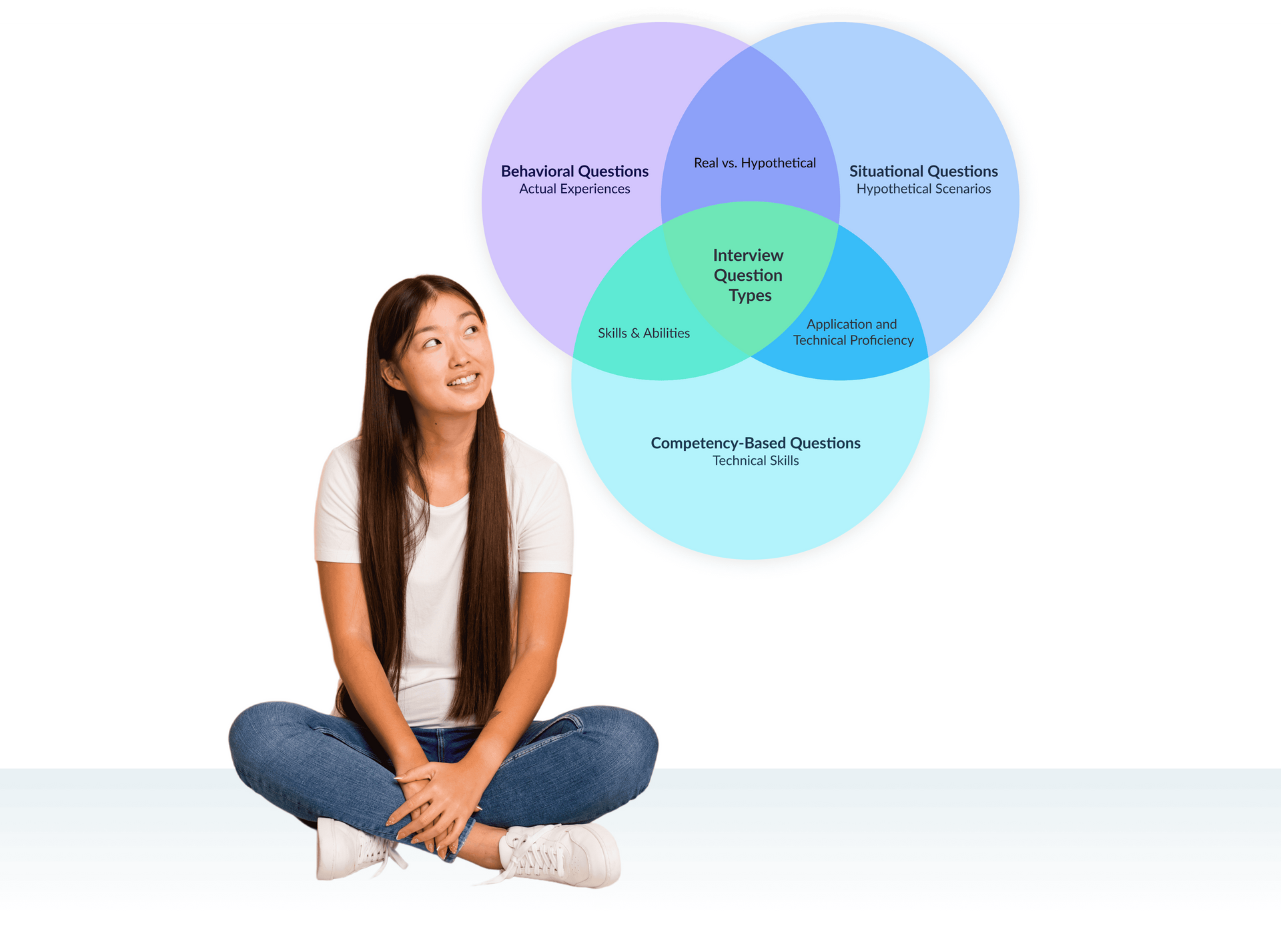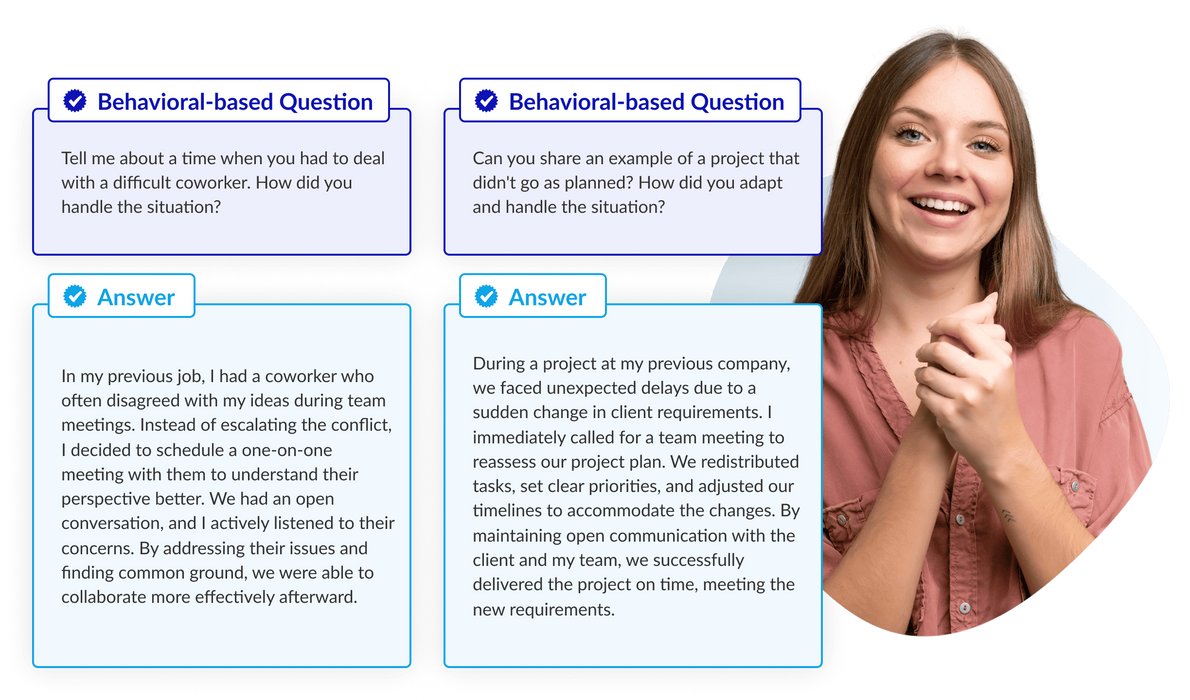
How to Ask and Evaluate Behavioral-Based Interview Questions
Written by
Jasmine WilliamsAbout the Author
Jasmine is an accomplished writer in HR and SaaS with over ten years of experience with top global companies. Her work has appeared in The Toronto Star, Marketing Brew, Girlboss, and Later.com.
Reviewed by
VidCruiter Editorial TeamAbout the Reviewer
The VidCruiter Editorial Team offers practical recruitment advice, drawing on insights from seasoned professionals. Our award-winning content, supported by industry specialists, underscores VidCruiter's dedication to innovation in recruitment.
Last Modified
Mar 25, 2024Behavioral-based interview questions are open-ended questions used to understand a job candidate's past experiences and skills relevant to a particular position. Answers to these questions will reveal a candidate's past behavior and actions, offering insight into how they may perform in the future.
What are Behavioral-Based Interview Questions?
Recruiters, hiring managers, and interviewers use behavioral-based interview questions to collect information from job candidates about their past experiences. To develop behavioral-based questions, you must first identify the core competencies and qualities required to succeed in the role, such as decision-making, persuasion, and problem-solving skills.
Then, design questions to see if the candidate has those desired traits and has demonstrated them in past roles.
Behavioral-based questions help you understand what a candidate did in their jobs, how they handled difficult situations, and why they made certain choices or behaved in a particular way.
Why do behavioral interview questions work so well?
There can often be a big gap between what we imagine we would do in a situation and how we actually respond. For example, in a study in the Journal of Homosexuality, nearly half of the participants said they would confront somebody who used a homophobic slur, but in reality, no participants who actually heard the slur confronted it.
By asking about things that actually happened instead of what someone would hypothetically do, you have a better chance of predicting how they will actually respond.
What’s the Difference Between Behavioral, Competency-Based and Situational Interview Questions?
Behavioral, competency-based, and situational are different types of interview questions that assess a candidate's suitability for a job.
Behavioral questions examine how a candidate has dealt with actual experiences. They reveal a candidate's thought process, decision-making skills, and ability to handle challenges. For example, a behavioral question could be: "Tell me about your experience dealing with a difficult customer. How did you handle the situation?"
In comparison, situational questions reveal how a candidate might perform in a hypothetical situation (e.g., "How would you deal with…"). They assess a candidate's problem-solving skills and ability to think on their feet. For example, a situational question could be: "If you were in charge of a project that was behind schedule, how would you approach getting it back on track?"
Lastly, competency-based questions assess a candidate's technical skills and abilities relating to the job's requirements. For example, a competency-based question for a software developer could be: "Can you describe your experience with object-oriented programming?"

Why are Behavioral-Based Interview Questions Used?
Predict Future Behavior
Having relevant experience doesn't always mean someone will do well in a job. A 2019 study in Personnel Psychology found that if you also assess a candidate's cognitive ability and personality traits, you can get a better picture of their skills, which can help predict if they will be successful in a role.
Behavioral-based questions can help you do just that. If you need someone who can make quick decisions, you might ask about a time when the candidate faced a tough choice under pressure. Based on their response, you can understand how they might handle a similar situation.
Assess Soft Skills
Behavioral-based questions are great for assessing a candidate's soft skills, such as communication, problem-solving, decision-making, teamwork, and leadership. By asking candidates to provide specific examples of how they have dealt with different situations, you can evaluate their ability to apply those skills in the future.
If you're looking for a candidate with strong leadership skills, you could ask the candidate to describe a time when they had to take charge and lead a team through a complex project. Their response will give you a sense of their leadership style, communication skills, and ability to motivate and inspire others.
Behavioral questions are the top way companies test soft skills
According to LinkedIn’s 2019 Global Trends Report, 75% of talent acquisition professionals use behavioral questions to assess soft skills, followed by reading body language (70%), situational questions (58%), projects, (31%), and tech-based assessments (19%).

Identify Unqualified Applicants
If a candidate can't provide solid examples, this could be a sign that they are not qualified for the job.
You can also see if a candidate is a good fit for the company culture by asking about their work style, communication style, and values.
Compare Candidates Fairly and Legally
Conducting structured interviews using the same questions in every interview will ensure you judge all candidates against the same criteria, reducing hiring bias. Additionally, behavioral-based questions are grounded in job-related competencies and skills, giving you a more objective way to evaluate candidates.

How To Evaluate Answers To Behavioral Interview Questions
Evaluating answers to behavioral questions can be more complicated than you might think. You don't want to only listen to what your candidates are saying, but how they're saying it.
Here are a few things to consider in your candidate's response to a behavioral question.
The STAR Format
You've likely heard of the STAR format. It stands for…
Situation: Describe the situation
ask: Explain what the task at hand was
ction: Describe what you did to complete the job
Result: Share the direct and indirect results of your efforts
You can tell if a candidate is aware or has prepared for their interview if they can answer using this format. By actively looking for STAR answers as you go, you can draw out the responses you need to determine the candidate's suitability for the job.
Here’s an example of a behavioral question and answer using the STAR method:
- Situation
“Once, when I was working as a marketing manager, there was a disagreement between two team members on the budget allocation for an upcoming social media campaign.”
- Result
“The conflict resolution led to a more balanced budget allocation and a more successful campaign. Team morale improved, and we hit our campaign objectives, exceeding engagement and conversion rate targets.”
Know The Answers You’re Looking For
Consider using an interview scorecard that contains rating scales that correspond to your behavioral-based questions. This will help you define in advance what a good answer sounds like and clarify the difference between different numbers on the scale. This way, you’ll know a good answer when you hear one because it shows the candidate has the core competencies you are looking for.
Learnings from Past Experiences
If a candidate didn't handle a situation in the exact way you were looking for, you can still evaluate whether they'd be a good fit based on what they learned from past experiences. Understanding what worked and didn't work in a particular situation shows they can learn and grow in a job and make better decisions and choices in the future.
A Pattern of Behavior
Are particular themes coming up in your candidate's answers again and again? A pattern of behavior is more revealing and a stronger indicator of how a candidate would perform in a role than a single example.
Say you're looking for someone with strong customer service skills. Ask your candidates to describe a time when they had to work with a demanding customer or a customer had an issue they couldn't resolve. It’s a good sign if they can provide multiple examples of creative problem-solving.
Pay Attention to Attitude
Survey your high performers to discover their top and bottom three attitude qualities and use these traits as criteria to assess your candidates' answers to behavioral-based questions. For example, if you know that passion is a quality your top salespeople have, listen closely and see if you can feel their passion in their answers.
These personality traits are job dealbreakers
According to a CareerBuilder survey, more than half of employers would not consider a candidate who appears arrogant or entitled (59%), or lacks accountability (52%).

Types of Behavioral Interview Questions
According to this resource from the Government of British Columbia, there are two overarching types of behavioral questions: leading and probing questions.
Leading Questions
Leading questions are behavioral questions you create before an interview. These questions will evaluate if a candidate possesses essential job skills and knowledge.
Here are a couple of examples of leading questions:
“Give an example of a time you were faced with multiple competing deadlines. How did you balance your workload to meet all of the project goals?”
“Describe a time you identified a new, unusual or different approach for addressing a problem or task. How did you implement the approach, and what was the outcome?”
Probing Questions
Probing questions are follow-up questions you can ask candidates when initial answers are vague, evasive, or don't fully address the lead question.
Some examples of probing questions are:
“If you had to relive that situation, what would you do?”
“How did you work with your colleagues to resolve that situation?”
Top Behavioral Interview Questions
Here are some common core competencies and behavioral question examples you could ask to assess them.
Competency
Example Question
Teamwork
"Tell me about a time when worked with a difficult team member."
Initiative
“Tell me about a time when you took the initiative to go above and beyond in your work. What was the outcome?"
Communication
“Describe a time you had to communicate complex information to someone who didn't have the same level of expertise as you. How did you ensure they understood?"
Customer Service
"Describe a time when you dealt with an angry or dissatisfied customer."
Goal Setting
“Describe a time when you set a challenging goal for yourself. How did you set the goal, and what were the results?”
Critical Thinking
“Describe a time when you anticipated potential problems and developed preventative measures.”
Problem-Solving
"Describe a time when you solved a complex problem. What steps did you take?"
Leadership
Adaptability
“Describe a time when you had to quickly adapt to a new situation or change in your work."
Behavioral Interview Questions for Managers
Behavioral interview questions for managers should assess a candidate’s leadership and management skills.
Competency
Example Question
Conflict Resolution
“Please share a situation where you had to mediate conflict between two team members.”
Performance Management
"Describe a time you had to address a performance issue with one of your team members.”
Delegation
"Tell me about a time you delegated a task or project to a team member. How did you ensure they had the necessary resources and support to complete it successfully?"
Coaching and Mentoring
"Tell me about a time you coached or mentored a team member to help them develop their skills. What was the situation, and what was the outcome?"
Behavioral Interview Questions for Nurses
Behavioral interview questions for nurses should assess their clinical skills, patient care abilities, and overall fit for the role.
Competency
Example Question
Patient Care
"Describe a situation when you had to care for a patient with complex medical needs."
Compassion
"Describe a situation when you had to provide emotional support to a patient or their family. What was your approach, and what was the outcome?"
Time Management
"Tell me about your experience with managing multiple patient care responsibilities at once. How did you prioritize your tasks and ensure that each patient received the care they needed?"
Elevate Your Hiring Process With Behavioral-Based Interview Questions
Behavioral-based interview questions can help you predict future behavior based on your candidate's experience. Still, experience is only part of it. Pay attention to your interviewee's attitude and notice behavior patterns to find candidates with the skills, qualifications, and potential to excel and thrive.

Frequently Asked Questions
What Are Some Common Mistakes To Avoid When Conducting A Behavioral Interview?
Here are the three most common mistakes interviewers make when conducting behavioral interviews:
- Asking easy-to-practice questions. Questions like "What are your greatest strengths and weaknesses?" "Why are you the best candidate?" and "Where would you like to be in five years?" are too overused to provide relevant answers.
- Not taking enough time to get the complete picture. Get to know the combination of a candidate's strengths and limitations. For example, someone may have strong analytical skills, but if they aren't also decisive, this could be more of a weakness than a benefit.
- Not digging in deeper into vague answers. When candidates claim results from what they did, ask for specific metrics or examples and probe for further details. Pay attention to the consistency and depth of their responses.
How Do You Adapt Behavioral Questions When Hiring For Remote Roles?
You’ll need to start by swapping out in-person interviews for video interviews when you’re hiring for remote roles. Consider adding or adjusting questions to ask about their experience leading or being on a remote team, or how they communicate with team members in different time zones to the question set for this role. This will also help you determine their level of experience with remote roles.
What If A Candidate Can't Provide A Relevant Behavioral Example?
If a candidate can't provide a relevant behavioral example, that doesn't necessarily mean you should disqualify them. Prepare for this before the first interview by coming up with one or two probing questions to go with each of your questions. That way, all candidates struggling to formulate an answer get asked the same probing questions.
These probing questions can encourage the candidate to highlight relevant transferable skills or experiences.

E-BOOK
The Modern Guide to Structured Interviewing
Get your free copy of VidCruiter’s comprehensive white paper about structured interviewing. This practical guide:
-
Shows you how you can use technology to optimize your hiring
-
Teaches you how to develop and conduct a structured interview process
By providing email address, you agree to receive updates
from Vidcruiter.
Read our Privacy Policy.



